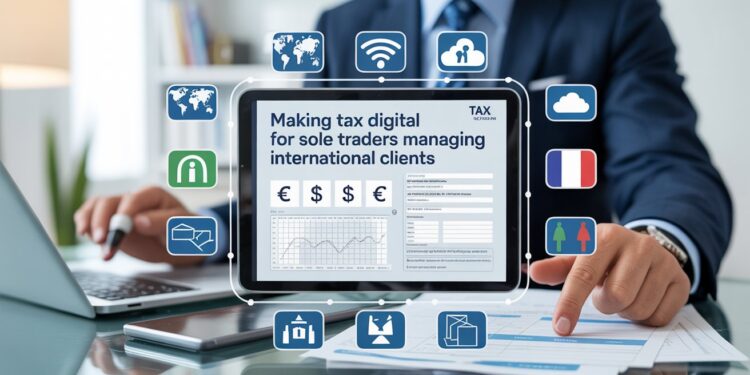Challenges of Managing International Clients
Sole traders working with international clients face unique challenges under HMRC’s Making Tax Digital initiative. Different currencies, overseas payments, and cross-border tax implications can complicate bookkeeping, making accurate quarterly submissions essential. Understanding how Making Tax Digital for sole trader applies in an international context is crucial to avoid errors and penalties while maintaining smooth operations.
Tracking Foreign Income
One of the main challenges is tracking foreign income accurately. Payments from clients abroad may be received in different currencies, via bank transfer, PayPal, or other payment platforms. Manual conversion and recording can be time-consuming and prone to mistakes. MTD-compliant software allows sole traders to automatically capture income from multiple sources, convert currencies using up-to-date exchange rates, and categorise transactions correctly for quarterly HMRC submissions.
Managing Expenses
Expense management is equally important for businesses dealing with international clients. Costs such as foreign bank fees, software subscriptions, travel, or customs-related expenses need to be recorded accurately to claim allowable deductions. Digital MTD tools consolidate these expenses, link them to specific client projects, and generate reports that are audit-ready, reducing the risk of errors and easing compliance.
Cash Flow Forecasting
For sole traders with multiple overseas clients, cash flow forecasting is essential. The best free making tax digital software platforms provide real-time insights into outstanding invoices, projected income, and upcoming tax liabilities. This allows sole traders to:
- Anticipate quarterly tax payments
- Plan for fluctuations in foreign exchange
- Ensure sufficient funds are available when HMRC deadlines arrive
Integration Benefits
Integration is another benefit. Many MTD-compliant solutions connect seamlessly with bank accounts, invoicing tools, and payment gateways used for international transactions. This reduces manual data entry and ensures that every payment is captured correctly, streamlining the reporting process and helping sole traders maintain accurate financial records with minimal effort.
Automated Alerts and Reporting
Finally, automated alerts and reporting features are particularly useful for businesses dealing with cross-border clients. The software can flag overdue invoices, unusual transaction patterns, or discrepancies between income and expenses, ensuring sole traders remain compliant and can take action promptly when needed.
Conclusion
In conclusion, sole traders managing international clients face specific challenges under Making Tax Digital. By adopting appropriate MTD-compliant software, they can automate income and expense tracking, manage foreign currency transactions, forecast tax obligations, and submit quarterly updates with confidence. Implementing these tools ensures that Making Tax Digital for sole trader compliance is straightforward and accurate, allowing sole traders to focus on expanding their international client base while staying fully compliant with HMRC regulations.
Do Read: Professional Executive Office Relocation Experts in Sherman Oaks
















